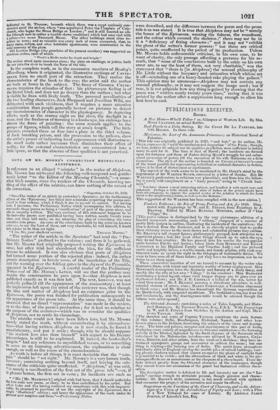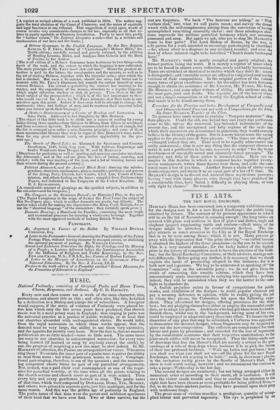PUBLICATIONS RECEIVED.
BOOKS.
A New Home —Who'll Follow ? or, Glimpses of Western Life. By Mrs. 3Ianv CLAYERS, an actual Settler.
Rol Pearls in a False Setting. By the Count DE LA PASTURE, late 18th Hussars. In three vols.
Marianne, the Last of the Asmonean Princesses ; an Historical Novel of Palestine.
[This tale was originally published in 1825, " and lost," as its author, Mr. OGLE, expresses it, "ambl the confusion and stagnation " of the Panic ; though, we fear, neither its subject nor its qualities as a fiction were sufficient to induce ninny to seek for it. The time is that of Herod ; the incidents are formed upon his tbrtunes and those of Judaea during Herod's struggle for and subse- quent possession of power, till the execution of his wife Mariamne on a false accusation. The style of the author is founded on Cfrarraa:mtrAen's—one of the worst possible for representing individual or national character in fiction, unless it be that of rhetorcians or auctioneers.
The reprint of the work seems to be sanctioned in Mr. Cleves mind by the imprimatur of Sir WALTER SCOTT, conveyed in a letter of thanks. But Sir Waraen's good-nature in criticism was proverbial; and from him the follow- ing is surely cold compliment on a " hasty perusal," owing to " Circuit busi- ness."
" Yon have chosen a most interNing subject, and handled it with mnelt taste and judgment. Perhaps a little sketch of the state ot Judaea at the period might have hem: advantageous, to apprize the general reader of the relation in which the Jews • stood to the mughbouring states, as well as to the Romans."
This suggestion of Sir WALTER has been complied with in the new edition.] Findcn's Tableaux ; the Iris of Prose, Poetry, and Art, 1840. Illus- trated with Engravings by W. and E. FINDEN, front Paintings by J. BROWNE. Edited by MIRY RUSSELL MITFORD, author of " Our Village," [This year's volume is distinguished by the very picturesque addition of a • fiineiful framework surrounding each " tableau," composed of a number of pretty little designs in outline, illustrating the incidents of the narratives: the miles is derived from the Germans, and is so cleverly adopted that we prefer these visionary scenes to the more showy and substantial pictures they enclose. Mr. BnowNe's tall elegant figures, picturesquely grouped, look attractive to a superficial glance ; but, like most other things dressed up to catch the eye, they do not bear scrutiny. He has pressed into his service the two popular opera heroines Fidelio and Amine; taken hints from Henuner and EDWIN LANDSEElt in his Highland Family and Venetian Lady ; and has pictured rustic and knightly lovers, a warlike monk, and female pilgrim, with such sen- timental looks as ravish the sight in the titlepages of fashionable ditties. We seem to have seen nil of them before; yet they leave no impression, nor do we desire to see them again. These emasculate inanities of art are turned to account by the writer who illustrates them, with talent and ingenuity worthy of better employment. Miss 31rrroao's descriptions have the freshness and fluency of a lively fancy, and sparkle like the rills of her own " Village " in the sunshine : Miss BARRETT contributes a lyrical legend, whose vivid images dispose one to gloss ever its rhythmical detects; and Mr. J. It. CHORLEY a ballad of the sea, better for sound than sense; Mr. J. Hucurs narrates a chivalrous adventure in well- rounded stanzas of ottara time; BARRY CoaxwALL a Venetian elopement in blank verse; and Mr. Houxs: has dramatized the German superstition of the Death-fAch, with congenial mysticism. The bookbinder, too, uts done his part handsomely, and the drawingroom-table would, be adorned though the volume were never opened] The Oriental Annual; containing a series of Tales, Legends' and Histo- rical Romances. By THOMAS 13AcoN, Esq., F.S.A. With Engravings by W. and E. FreDee from Sketches by the Author and Capt. MEA- DOwS TAYLOR. 1840.
[The sketches and notes of Captain TAYLOR constitute the main feature of this volume; Delhi, Boorhanpoor, Hydrahad, Nassuk, and other less- known places in the Dekkan, tbrinshing the subjects of the views and descrip- Roue. The fines and palaces, mosques and mausoleums of this part of India, displaying every variety of magnificence in Oriental architecture—the frowning severity of the 'Hindoo, lightened by the florid elegance of the Saracenic style introduced by the Mahomedan invaders—are pi6tnred by 'WARREN, CRES.• WeeK, BIDDEN, and other artists, from the amateur's sketches they have in- troduced appropriate groups and accessories to enliven the scene ; but one thing is wanting—the burning sun of India. The moist dense atmosphere and Cloudy skies of England envelop the marble piles of ruined buildings, cast- ing gloomy shadows around, that almost overpower the gleam of sunlight that is permitted to be visible; and the alternations of black and white in the pic- turesque effects are as monotonous as the chequers of a chess-board. These de- fects detract greatly from the Oriental character of the landscapes, though they cannot lessen our admiration of the grand but fantastical edifices them- selves.
The deecriptive matter is deficient in life and interest; nor are the " Le- gends" exciting enough to stimulate perusal, though genuine and charac- teristic: Mr. BACON'S style, moreover, is too much overlaid with epithets that encumber the progress of his narrative MI impair its effects.] Suggestions on the Functions of the Court of Chancery, and on the Advan- tages of a Union of the Jurisdictions of Equity and Law ; With a Plan of A New Tribunal for cases of Lunacy. By ARTUUR JAMES JORNES, of Lincoln's Inn, Esq. [A reprint or revised edition of a work published in 1834. The author sug- gests the total abolition of the Court of Chancery, and the union of equitable and legal functions in one tribunal. This suggestion, if acted upon, would of course involve very considerable changes in the law, especially in all that re- lates to purely equitable or Chancery jurisdiction. Partly to meet this, partly for "further reform," Mr. JoaNEs, advocates a code—that is, a revision and condensation of our laws and hiw-books.] 4 Hebrew Grammar, in the English Language. By the Rev. JOSEPH SAMUEL C. F. FREY, Editor of " Vanderhooght's Hebrew Bible," &v.
Tenth edition ; carefully revised and greatly enlarged, by the. addition of Reading Lessons, Rules, and Analyses from Genesis and the Book of Psalms, by the Author. [The tenth edition of a Hebrew Grammar bears testimony to two things—the merit of the work, and the extent to which the language is now cultivated.
The main principle of Mr. Fluty is—" slow and sure." Hence the greatest at-
tention is paid to the letters, the vowel-points, and the accents, as well as to the art of reading Hebrew, together with the irregular verbs; after which the hill is climbed. But even a 8crwo En, should one arise, had better not be
Content with MI', FREY'S Grammar, but consult the author himself or some veteran Hebraist. The virtual responsibility the student has incurred to his
master, and the expenditure of his money, stimulate to a regular diligence, which might otherwise slacken or sink in privacy. Then them is the dif- ficult subject of the pronunciation ; which is of the last importance to those
who would convert the Jews,- for Mr. FREY intimates that their taste is very Sensitive upon this point. Indeed it does seem bold to attempt to change the sentiments, ideas, and feelings of men, and to overturn their ancestral belief, when you cannot speak their language.]
A 211Other's Reminiscences of a Course of Berolise and Instruction. In three Parts. Addressed to her Daughter, by Mrs. BORtiON. [The object of this little book is to chalk out a course of reading for young ladies during three epochs—irons thirteen to fifteen, from fifteen to seventeen,
and from seventeen upwards. The books recommended are all pod enough, hut the list is arranged upon rather a miscellaneous principle; and some of them seem recommended because they were in vogue in Mrs. BORRON'S time, rather than for any great intrinsic merit, or peculiar applicability to the pre- sent age.] The Oracle of Rural Lift ; an Almanack for Sportsmen and Country . Gentlemen, 1840, being leap year. With fourteen Engravings and twelve Wood-cuts from Designs by W. and H. BARRAUD.
[Directions for gardening as well as sporting and amusing anecdotes interleave the Almannck ; and at the end are given the laws of' racing, coursing, and cricket ; with the race meetings of the year, and a list of winning horses and their owners during the present century.]
Politleal Abnanack, and the Annual Bloch Book : showing the 'salaries, pensions, sinecures, emoluments, places, annuities, privileges, and powers of the Army, Navy, Church, Law Courts, Civil List, Courts of Com- mission, and others feeding on the taxes: compiled from Parliamentary Papers, and dedicated to the Taxpayers of the United Kingdom. By 11. J. RICHARDSON.
[A considerable amount of gleanings on the specified subjects, in addition to the calendar—and for twopence.]
The Compact, or the Statesmen Rained; an Historical Play, in five acts. [The Papist Conspiracy in the reign of Jamrs the First firms the subject of this No-Popery play; which is neither dramatic nor poetic, but didactic. The author takes credit for making the characters—the King, Cecil, Raleigh, &e.— use the "identical language" of the chroniclers : they certainly speak prose.] Domestic Brewing ; a Handbook for Fatnilies, containing the most simple and. economical processes for insuring a wholesome beverage. Together with the most approved methods of making British Wines.
PAMPILLETS.
An Argument in Favour of the Ballot. By WILLIAM DOUGAL CHRISTIE, Esq.
A Letter to the Postmaster- General, showing the Practicability of the Penny Postage Plan, without having recourse to stamped covers, or abolishing the optional payment of postage. By WILLIAM COOPER. Sound and Extensive Education the Right, the Privilege, and the Blessing of a People; a Lecture delivered before the Northampton Association for the -Diffusion of Religious and Useful Knowledge, by the Rev. EDWARD CRA/G, M.A., F.R.S.E., Sec., Curate of Burton Latimer.
A Letter to the Marquis of Lansdowne, on the Government Plan of National Education. By the Rev. J. JACOB, LL.D.
Prefitee to the tenth edition of a Pamphlet entitled "Recent Measures for the Promotion of Education in England."



























 Previous page
Previous page